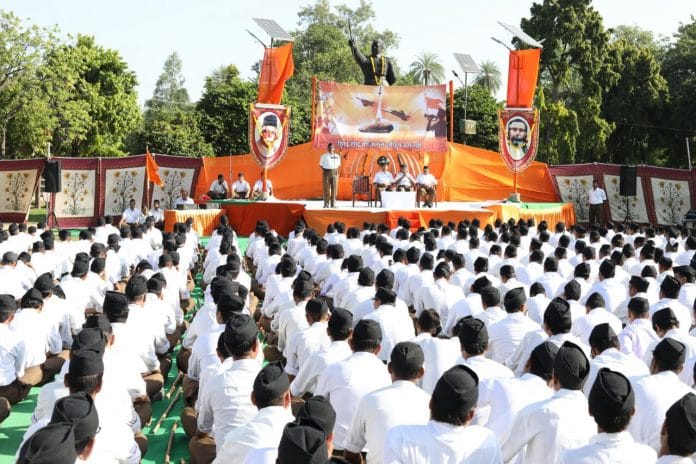In ‘Ballots: Ten Episodes That Have Shaped India’s Democracy’, journalist Rasheed Kidwai outlines the spirit of bipartisanship that followed Indira Gandhi’s murder by extremists. An excerpt:
The 1977 and 1984-85 general elections established beyond doubt that the Rashtriya Swayamsevak Sangh (RSS) was capable of taking tactical positions for the advancement of its larger political goals.
In 1977, it directed the Jan Sangh to merge with an entity like the Janata Party that had a sizable presence of socialists and breakaway Congress factions. The idea behind the merger was to further the Sangh’s interests, both short-term and medium-term.
When the 8th Lok Sabha elections were announced in 1984, the country was passing through perhaps its biggest political turmoil since partition of the country and Mahatma Gandhi’s assassination. The RSS supported a Congress that was led by a young man with little experience in politics or governance.
Their move was significant on several counts. Their new political entity, the Bharatiya Janata Party, was formed in 1980 and it was facing a major test during the 1984-85 polls.
Kuppahalli Sitaramiah Sudarshan, later to become the sarsanghchalak (head) of the RSS, held that all political parties were equal in the eyes of the RSS as long as they served the broad RSS agenda of cultural nationalism, swadeshi and Hindu renaissance.
The RSS supported a Congress that was led by a young man with little experience in politics or governance.
Their support for the Congress days after Indira Gandhi’s assassination was evident in an article authored by veteran RSS ideologue Nanaji Deshmukh published in a Hindi magazine Pratipaksh, which he ended with a call to bless and cooperate with Rajiv Gandhi when voting was less than a month away.
Indira was assassinated for her drastic actions to curb separatism in Punjab. In post-Independence India, Sikhs felt they had not gotten a fair deal during the 1947 partition of the country. This feeling was accentuated when several linguistic states were created but Punjab was denied the right of a Punjabi-speaking state. The demand for a Punjabi suba (province) was conceded in March 1966 by splitting the original Punjab into Haryana, Himachal Pradesh, and Punjab when Indira had just taken over as Prime Minister.
Indira had serious reservations about creating a Punjabi-speaking state. She felt that conceding the Akali’s demand was a reversal of a long-held Congress position.
Even after the creation of a Punjabi suba, the Akali Dal launched an agitation seeking Chandigarh for their state, and upped the ante by passing the Anandpur Sahib resolution that sought to recast the constitutional structure and toyed with an elusive Sikh homeland.
***********
Rajiv’s election campaign was aggressive and focused on making Sikhs seeking a separate homeland a key issue. The hidden agenda was to somehow exploit Hindu insecurity and project the Rajiv-led Congress as their sole saviour.
At 2.20 pm, Indira was officially declared dead.
Indira’s older son, Rajiv, was in West Bengal and heard the news en route as he flew back to Delhi. As soon as Rajiv reached Delhi, P.C. Alexander, principal secretary to Indira, and other trusted aides, told him that the Cabinet and the Congress party wanted him to be the Prime Minister.
Alexander said he had to make a determined bid to tear Rajiv away from Sonia at AIIMS. Sonia was pleading with Rajiv not to consent, but Rajiv believed that it was his duty to do so. It took Sonia many months to recover after Indira’s assassination.
The young Prime Minister quickly announced general elections ahead of schedule between 24 and 27 December, 1984. Rajiv’s election campaign was aggressive and focused on making Sikhs seeking a separate homeland a key issue. The hidden agenda was to somehow exploit Hindu insecurity and project the Rajiv-led Congress as their sole saviour.
There was an immense wave in Rajiv’s favour with the party winning 415 out of 543 Lok Sabha seats, a tally that his mother and illustrious grandfather had both failed to achieve.
Rajiv’s election campaign was aggressive and focused on making Sikhs seeking a separate homeland a key issue. The hidden agenda was to somehow exploit Hindu insecurity and project the Rajiv-led Congress as their sole saviour.
Riding on the sympathy of Indira Gandhi’s brutal assassination, it was a personal triumph for Rajiv. He had travelled over 50,000 kilometres by car, helicopter, and aeroplane in 25 days. There were talks of a secret meeting between Rajiv Gandhi and the then RSS chief Balasaheb Deoras resulting in the RSS cadre supporting the Congress in the 1984 Lok Sabha elections despite the presence of the BJP on the political scene.
The BJP, however, has denied any understanding between the RSS and the Congress under Rajiv Gandhi.
Excerpted, with due permission, from ‘Ballot: Ten Episodes that Have Shaped India’s Democracy’ by Rasheed Kidwai’. Publisher: Hachette India.






